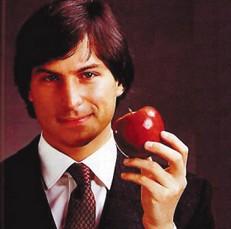CHAPTER TWENTY-FOUR
THE RESTORATION
回归
The Loser Now Will Be Later to Win
此刻的失败者终将胜利
Amelio calling up Wozniak as Jobs hangs back, 1997
Hovering Backstage
在幕后彷徨
“It’s rare that you see an artist in his thirties or forties able to really contribute something amazing,” Jobs declared as he was about to turn thirty.
“你很少能见到一个艺术家在三四十岁时还能有令人惊叹的作品。”乔布斯即将30岁的时候这样说。
That held true for Jobs in his thirties, during the decade that began with his ouster from Apple in 1985. But after turning forty in 1995, he flourished. Toy Story was released that year, and the following year Apple’s purchase of NeXT offered him reentry into the company he had founded. In returning to Apple, Jobs would show that even people over forty could be great innovators. Having transformed personal computers in his twenties, he would now help to do the same for music players, the recording industry’s business model, mobile phones, apps, tablet computers, books, and journalism.
乔布斯30多岁的时候,自他1985年离开苹果后的10年间,确实少有建树。但是当他1995年步入40岁以后,却成就卓著。那一年《玩具总动员》发行上映,第二年苹果收购NeXT,使他一举重返他当年创建的公司。回到苹果,乔布斯将证明,即使超过40岁的人也可以是最好的创新者。二十几岁,他就改变了个人电脑,现在,他将同样改变音乐播放器、唱片产业的商业模式、移动电话、应用软件、平板电脑、书籍以及新闻业。
He had told Larry Ellison that his return strategy was to sell NeXT to Apple, get appointed to the board, and be there ready when CEO Gil Amelio stumbled. Ellison may have been baffled when Jobs insisted that he was not motivated by money, but it was partly true. He had neither Ellison’s conspicuous consumption needs nor Gates’s philanthropic impulses nor the competitive urge to see how high on the Forbes list he could get. Instead his ego needs and personal drives led him to seek fulfillment by creating a legacy that would awe people. A dual legacy, actually: building innovative products and building a lasting company. He wanted to be in the pantheon with, indeed a notch above, people like Edwin Land, Bill Hewlett, and David Packard. And the best way to achieve all this was to return to Apple and reclaim his kingdom.
他之前告诉拉里·埃利森,他的回归策略是把NeXT卖给苹果,借此进入董事会,然后在那儿等着阿梅里奥出错。当乔布斯坚持说他的动机不是钱时,埃利森可能感到迷惑不解。但那的确部分属实。他既没有埃利森那种惹人注目的消费需求,也没有比尔·盖茨那种投身慈善事业的内在冲动,亦没有那种想看看自己在《福布斯》排行榜上能爬多髙的竞争意识。在他那自负和个人动力的驱使下,他要通过创造足以令世人敬畏的传奇来获得满足。这实际上包括两个方面:制造不断革新不断变化的伟大产品,以及建立一家有持久生命力的公司。他希望跟埃德温·兰德、比尔·休利特和戴维·帕卡德这些人一起在万神殿占据一席之地,甚至比他们还要髙一级。要实现这些,最好的方式就是回到苹果,夺回他的王朝。













